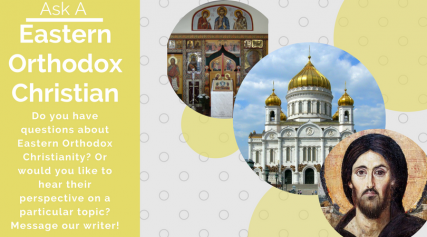What would you like to know about the Eastern Orthodox Christian faith? Submit your question.
Who is God?
“…You are God ineffable, beyond comprehension, invisible, beyond understanding, existing forever, and always the same. You and your only-begotten Son and Your Holy Spirit brought us into being out of nothing, and when we fell, you raised us up again…”
An excerpt from a prayer from the Divine Liturgy Service of Saint John Chrysostom.
Who is this God who has brought us into existence out of nothing? Who is this being who has existed forever and is always the same, having no beginning and no end and calls Himself I AM? Who is this God of one in essence and, at the same time, a community of three persons? Who are these three persons referred to as God the Father, God the Son, and God the Holy Spirit? Who is this God who is defined as love and infinitely and eternally more?
We can describe the Christian God as the Holy Trinity of three persons beginning with the Father who is the impulse of design and the original cause of all things that exist. Next is the only begotten Son and immortal Word of God who is the creative cause of whom all things were made. And finally, the Holy Spirit who proceeds from the Father and is the perfecting cause, the Creator of Life.
Saint Gregory the Theologian says, “To try to comprehend unbegottenness of the Father, begottenness of the Son, or procession of the Holy Spirit, would lead to insanity.”
However, we know these three distinct persons who are in communion with one another are what makes God be. They are mystically undivided, co-equal, of the same essence. Each person dwells entirely within the other in an unceasing movement of mutual love. This movement of mutual love is called the “life source” or “life” itself.
John 14:6
Jesus said to him, “I am” the Way, the Truth, and “the Life”….. (The implication here is that He is love, the life source).
In addition, within the Godhead, one could say that the function of the Holy Spirit of God is to pour out the love from the Father to the Son and return that love from the Son to the Father. Then the function of the Holy Spirit of God outside the Godhead is to pour out this love (this life source) into the creation and return this love, from us, back to the Godhead. This giving of oneself to another is love, and to become love is to exist.
In the Eastern Orthodox Church, we come to know the Father through Jesus Christ and in the Holy Spirit Who brings Christ to live in us (Matthew 11:27). Saint Paul states in Galatians 2:20, “I have been crucified with Christ, and I no longer live, but Christ lives in me.”
We can go on to say that we are spiritual beings in a carnal body and that if Christ our God, the life source, does not live in us, we become spiritually dead. Life in the spirit truly has no meaning without love. Our salvation is not just learning about God, but to enter into personal communion with Him and our fellow man, always remembering that sin is an interruption and separation of that communion.
God became man so that through God’s grace and mercy, man can become like God as experienced in the process of theosis. As Orthodox Christians, The Holy Trinity is an example of how we should strive to live and love one another. Man is created as a personal being — one who is truly human when he loves and is loved. It is how we relate to God, and one another, which defines us as persons and to love is to live!







